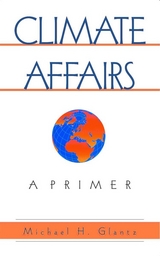
Climate Affairs sets forth in a concise primer the base of knowledge needed to begin to address questions surrounding the unknown impacts of climate change. In so doing, it outlines a new approach to understanding the interactions among climate, society, and the environment. Chapters consider:
• the effects of climate around the world
• important but overlooked aspects of climate-society-environment interactions
• examples of societal uses, misuses, and potential uses of climate-related information such as forecasts
• a research agenda, challenges, and methodologies for future climate research.
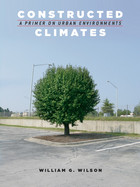
As our world becomes increasingly urbanized, an understanding of the context, mechanisms, and consequences of city and suburban environments becomes more critical. Without a sense of what open spaces such as parks and gardens contribute, it’s difficult to argue for their creation and maintenance: in the face of schools needing resources, roads and sewers needing maintenance, and people suffering at the hands of others, why should cities and counties spend scarce dollars planting trees and preserving parks?
In Constructed Climates, ecologist William G. Wilson demonstrates the value of urban green. Focusing specifically on the role of vegetation and trees, Wilson shows the costs and benefits reaped from urban open spaces, from cooler temperatures to better quality ground water—and why it all matters. While Constructed Climates is a work of science, it does not ignore the social component. Wilson looks at low-income areas that have poor vegetation, and shows how enhancing these areas through the planting of community gardens and trees can alleviate social ills. This book will be essential reading for environmentalists and anyone making decisions for the nature and well-being of our cities and citizens.
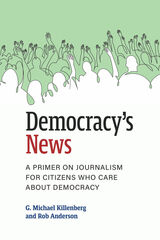
Since the Founding, America’s faith in a democratic republic has depended on citizens who could be trusted to be communicators. Vigorous talk about equality, rights, and collaboration fueled the revolution, the Declaration of Independence, and the Constitution with its amendments. In a republic, the people set the terms for their lives not individually, but in community. The genius of keeping it alive exists in how everyday citizens talk and listen, write and read, for a common good. Dialogue and deliberation—rather than an accumulation of individual preferences—sustains a republic, yet a diminished and scarred institution of journalism jeopardizes citizens’ access to shared and truthful information. A disturbing “what’s in it for me?” attitude has taken over many citizens, and a creeping, autocratic sense of dismissive accusation too often characterizes the political style of elected officials.
The basic fuel for democracy is the willingness of informed citizens to take each other seriously as they talk about political choices. Once we begin to clam up, build walls, and dismiss each other, we unravel the threads tying us to the Founders’ vision of a republic. A free press and free speech become meaningless if not supported by sustained listening to multiple positions. There are those who profit by dividing citizens into two camps: a comfortable “us” versus a scary “them.” They make their case with accusations and often with lies. They warp the very meaning of communication, hoping citizens never truly discover each other’s humanity. Democracy’s News discusses today’s problems of public communication in the context of history, law, and interpersonal life. News should not be something to dread, mistrust, or shun. Aided by reliable, factual journalism, citizens can develop a community-based knowledge to cope with social issues great and small. They come to treat neighbors and strangers as more than stereotypes or opponents. They become collaborators with whom to identify and sustain a working republic where news, citizenship, and public discourse merge.

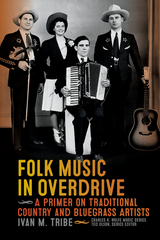
Originally built around interviews with these figures and their close associates, these thirty-nine revised articles yield new information from a variety of sources, much from Bear Family boxed sets as well as counsel, advice, and knowledge shared by other music scholars. Tribe's profiles cover musicians and bands that were bluegrass pickers and singers themselves, as well as some musicians who are often characterized as traditional country musicians. Some led bands for all or part of their careers, while others ranked as noted sidemen or band members. Others composed songs that have become popular, indeed often standard, fare in the bluegrass field.
As part of the Charles K. Wolfe Music Series, formed in honor of the late music scholar, Folk Music in Overdrive succinctly advances traditional music scholarship and Wolfe’s own love of early country and bluegrass.
IVAN TRIBE is emeritus professor of history at the University of Rio Grande in Ohio. He is the author of The Stonemans: An Appalachian Family and the Music That Shaped Their Lives, Mountaineer Jamboree: Country Music in West Virginia, and Country: A Regional Exploration.
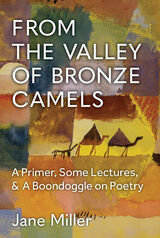
Jane Miller loves poetry. In these provocative and deeply insightful essays, she unpacks the work of giants like Adrienne Rich, Paul Celan, Marina Tsvetaeva, Osip Mandelstam, and Federico García Lorca alongside painters such as Caravaggio and Paul Klee, as well as ancient Chinese music and techniques of the contemporary poem. Miller explores the use of the question mark in the history of poetry and its function as a revelation of poetic voice. She considers the positive and negative aspects of surrealism on the contemporary poem, its anti-feminist origins in France, its contemporary usage, and the benefits of super-real images. Miller examines how identity politics might affect the imagination. She describes ancient Chinese musical instruments to show how their sounds resonate off/in American poems and on the aural integrity of the lyric poem. She interrogates the political implications of language and the degeneration and regeneration of words. Finally, in an essay about what she dares not say about poetry, she comes out against forms of surrealism, narrative, jargon, rhetoric, irony, and appropriation. This masterful work can be read as advice to a young writer, but it also invites us into the mind of a writer who has developed her craft through the course of a lifetime of writing, reading, and exploring the world, showing not only the ideas that influenced her—feminist, lesbian, and international works—but also how Miller has, in turn, influenced ideas.
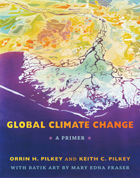
After explaining the greenhouse effect, Pilkey, writing with son Keith, turns to the damage it is causing: sea level rise, ocean acidification, glacier and sea ice melting, changing habitats, desertification, and the threats to animals, humans, coral reefs, marshes, and mangroves. These explanations are accompanied by Mary Edna Fraser’s stunning batiks depicting the large-scale arenas in which climate change plays out.
The Pilkeys directly confront and rebut arguments typically advanced by global change deniers. Particularly valuable are their discussions of “Climategate,” a manufactured scandal that undermined respect for the scientific community, and the denial campaigns by the fossil fuel industry, which they compare to the tactics used by the tobacco companies a generation ago to obfuscate findings on the harm caused by cigarettes.
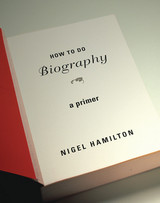
It is not surprising that biography is one of the most popular literary genres of our day. What is remarkable is that there is no accessible guide for how to write one. Now, following his recent Biography: A Brief History (from Harvard), award-winning biographer and teacher Nigel Hamilton tackles the practicalities of doing biography in this first succinct primer to elucidate the tools of the biographer’s craft.
Hamilton invites the reader to join him on a fascinating journey through the art of biographical composition. Starting with personal motivation, he charts the making of a modern biography from the inside: from conception to fulfillment. He emphasizes the need to know one’s audience, rehearses the excitement and perils of modern research, delves into the secrets of good and great biography, and guides the reader through the essential components of life narrative.
With examples taken from the finest modern biographies, Hamilton shows how to portray the ages of man—birth, childhood, love, life’s work, the evening of life, and death. In addition, he suggests effective ways to start and close a life story. He clarifies the difference between autobiography and memoir—and addresses the sometimes awkward ethical, legal, and personal consequences of truth-telling in modern life writing. He concludes with the publication and reception of biography—its afterlife, so to speak.
Written with humor, insight, and compassion, How To Do Biography is the manual that would-be biographers have long been awaiting.
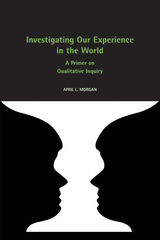
At once accessible and sophisticated, this primer introduces a set of specific principles and procedures designed to promote a deeper understanding of the nuances of human experience and reflection.
The empirical, qualitative approach outlined in this book, which has been refined over the past thirty years at the University of Tennessee, uses disciplined forms of dialogue as the primary means of gathering and assessing information about human experience. Properly known as existential-hermeneutic-phenomenology (or simply phenomenology in everyday usage), this style of scholarly investigation has been applied to illuminate a wide range of research questions in fields such as psychology, child and family studies, marketing, nursing, communications, political science, and more. This book seeks to make this transdisciplinary tradition of research more accessible to a wider audience.
Investigating Our Experience in the World begins with an overview of basic concepts. April L. Morgan provides clear definitions of key terms and succinctly describes how phenomenological research procedures evolved from philosophical explorations of consciousness. Although phenomenological methods are rife with philosophical underpinnings, the author remains focused on describing specific research applications. Each subsequent chapter describes a major stage of a research study. For example, Morgan leads readers through framing the project and undertaking the initial bracketing interview to conducting phenomenological interviews with participants, interpreting texts, thematizing, and developing thematic structure.
Rounding out discussion of the research procedures is a full chapter devoted to writing the research report. The book concludes with a section answering common questions about this style of phenomenological research. Appendices provide a glossary, sample forms, and references for further study.
Aspects of real-world research projects are continually highlighted, illuminating key methodological points. Morgan recognizes the primary investigators and research teams behind such studies for contributing significantly to the development of contemporary phenomenological research methods.
While a member of the political science faculty at the University of Tennessee, Knoxville,
April L. Morgan participated in phenomenology labs housed in the university’s Department of Psychology and in the College of Nursing. Morgan coedited The Art of College Teaching: Twenty-eight Takes, with Marilyn Kallet, and Ethics and Global Politics: The Active Learning Sourcebook, with Lucinda Joy Peach and Colette Mazzucelli.

One of the great debates of our time concerns the predominant form of land use in America today -- the all too familiar pattern of commercial and residential development known as sprawl. But what do we really know about sprawl? Do we know what it is? Where did it come from? Is it really so bad? If so, what are the alternatives? Can anything be done to make it better? The Limitless City offers an accessible examination of those and related questions. Oliver Gillham, an architect and planner with more than twenty-five years of experience in the field, considers the history and development of sprawl and examines current debates about the issue. The book:
- offers a comprehensive definition of sprawl in America
- traces the roots of sprawl and considers the factors that led to its preeminence as an urban and suburban form
- reviews both its negative impacts (loss of open space, increased pollution, gridlock) as well as its positive aspects (economic development, personal freedom, privacy)
- considers responses to sprawl including "smart growth," urban growth boundaries, regional planning, and the New Urbanism
- looks at what can be done to improve and counterbalance sprawl
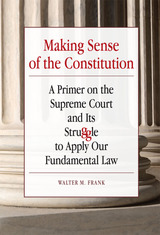
In Making Sense of the Constitution: A Primer on the Supreme Court and Its Struggle to Apply Our Fundamental Law, Walter Frank tackles in a comprehensive but lively manner subjects rarely treated in one volume.
Aiming at both the general reader and students of political science, law, or history, Frank begins with a brief discussion of the nature of constitutional law and why the Court divides so closely on many issues. He then proceeds to an analysis of the Constitution and subsequent amendments, placing them in their historical context. Next, Frank shifts to the Supreme Court and its decisions, examining, among other things, doctrinal developments, the Court’s decision making processes, how justices interact with each other, and the debate over how the Constitution should be interpreted.
The work concludes with a close analysis of Court decisions in six major areas of continuing controversy, including abortion, affirmative action, and campaign finance.
Outstanding by the University Press Books for Public and Secondary Schools

This book allows readers to understand the relationships and memories they often form around games, and music is central to this process. The quest into the past begins with this book, a map that leads to the intersection between nostalgia and videogame music. Informed by research on musicology, memory, and practices of gaming culture, this edited volume discusses different forms of nostalgia, considers how videogames display their relation to those forms, and explores the ways theoretically self-conscious positions can be found in games. An important scholarly addition to the burgeoning field of ludomusicology, this book will appeal to researchers, educators, practitioners, undergraduate and graduate students, and videogame fans and players alike.
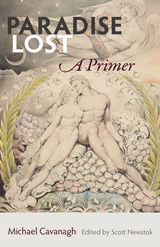
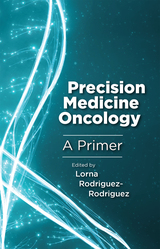
Precision Medicine Oncology: A Primer is a concise review of the fundamental principles and applications of precision medicine, intended for clinicians, particularly those working in oncology. It provides an accessible introduction to the technological advances in DNA and RNA sequencing, gives a detailed overview of approaches to the interpretation of molecular test results and their point-of-care implementation for individual patients, and describes innovative clinical trial designs in oncology as well as characteristics of the computational infrastructures through which massive quantities of data are collected, stored, and used in precision medicine oncology.
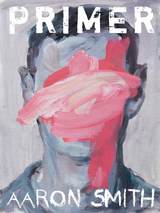
Smith's poetry explores that inexplicable tension between what we say and how we actually feel, exposing the complications of intimacy and the limitations of language to bridge those distances between friends, family members, and lovers. What we deny, in the end, may be just what we actually survive.
Mortality in Smith's work remains the uncomfortable foundation at the center of our relationship with others, to faith, to art, to love as we grow older, and ultimately, to our own sense of who we are in our bodies in the world.
The struggle of this book, finally, is in naming whether just what we say we want is enough to satisfy our primal needs, or are the choices we make to stay alive the same choices we make to help us, in so many small ways, to die.
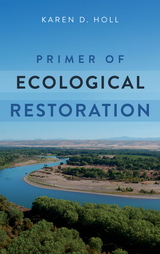
The Primer of Ecological Restoration is a succinct introduction to the theory and practice of ecological restoration as a strategy to conserve biodiversity and ecosystems. In twelve brief chapters, the book introduces readers to the basics of restoration project planning, monitoring, and adaptive management. It explains abiotic factors such as landforms, soil, and hydrology that are the building blocks to successfully recovering microorganism, plant, and animal communities. Additional chapters cover topics such as invasive species and legal and financial considerations. Each chapter concludes with recommended reading and reference lists, and the book can be paired with online resources for teaching.
Perfect for introductory classes in ecological restoration or for practitioners seeking constructive guidance for real-world projects, Primer of Ecological Restoration offers accessible, practical information on recent trends in the field.
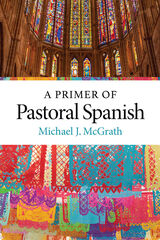
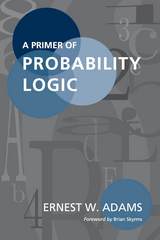
This book is meant to be a primer, that is, an introduction, to probability logic, a subject that appears to be in its infancy. Probability logic is a subject envisioned by Hans Reichenbach and largely created by Adams. It treats conditionals as bearers of conditional probabilities and discusses an appropriate sense of validity for arguments such conditionals, as well as ordinary statements as premisses.
This is a clear well-written text on the subject of probability logic, suitable for advanced undergraduates or graduates, but also of interest to professional philosophers. There are well-thought-out exercises, and a number of advanced topics treated in appendices, while some are brought up in exercises and some are alluded to only in footnotes. By this means, it is hoped that the reader will at least be made aware of most of the important ramifications of the subject and its tie-ins with current research, and will have some indications concerning recent and relevant literature.
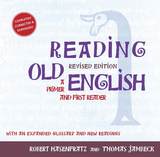
With the immersion method dominating contemporary language learning, the knowledge of traditional grammar is at a low ebb, creating real barriers to any student wanting to learning dead or historical languages. This revised edition of Reading Old English aims to equip readers (advanced undergraduates, graduate students, and autodidacts) with the necessary tools to read the oldest recorded forms of the English language by explaining key language features clearly and methodically, without simplifying any of the core grammatical concepts. It includes a number of helpful exercises, a variety of interesting and unusual Old English texts to translate, as well as appendices covering the basics of traditional grammar and sound changes in Old English, along with an introduction to poetic structure.
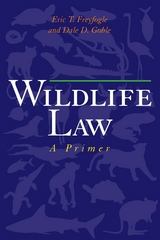
Authors Eric T. Freyfogle and Dale D. Goble are legal scholars who are experts in wildlife law. This book is the first ever to survey the entire field, covering state and federal law with a strong grounding in wildlife science. The writing style is lively and engaging, with descriptions of unusual and intriguing cases that illustrate key points and bring to life the importance and intricacies of the field.
The book includes thirteen chapters on topics such as
• what wildlife law is, what it covers, and what it seeks to achieve;
• constitutional issues and key federal statutes;
• wildlife liability issues, from spider bites to escaped zoo animals;
• state game laws, hunting and fishing rights of Indian tribes;
• and the Endangered Species Act.
Wildlife Law fills a long-standing gap in the literature and introduces readers to the basics of wildlife law while exploring such current controversies as endangered species protection, tribal fishing rights, game ranches, and the challenges of constructing wildlife corridors. It is a much-needed addition to the bookshelf of everyone working with or concerned about wildlife in the United States.
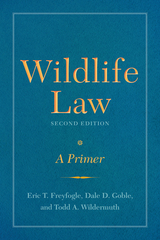
This revised and expanded second edition retains key sections from the first edition, describing basic legal concepts while offering important updates that address recent legal topics. New chapters cover timely issues such as private wildlife reserves and game ranches, and the increased prominence of nuisance species as well as an expanded discussion of the Endangered Species Act, now more than 40 years old. Chapter sidebars showcase pertinent legal cases illustrating real-world application of the legal concepts covered in the main text.
Accessibly written, this is an essential, groundbreaking reference for professors and students in natural resource and wildlife programs, land owners, and wildlife professionals.
READERS
Browse our collection.
PUBLISHERS
See BiblioVault's publisher services.
STUDENT SERVICES
Files for college accessibility offices.
UChicago Accessibility Resources
home | accessibility | search | about | contact us
BiblioVault ® 2001 - 2024
The University of Chicago Press









